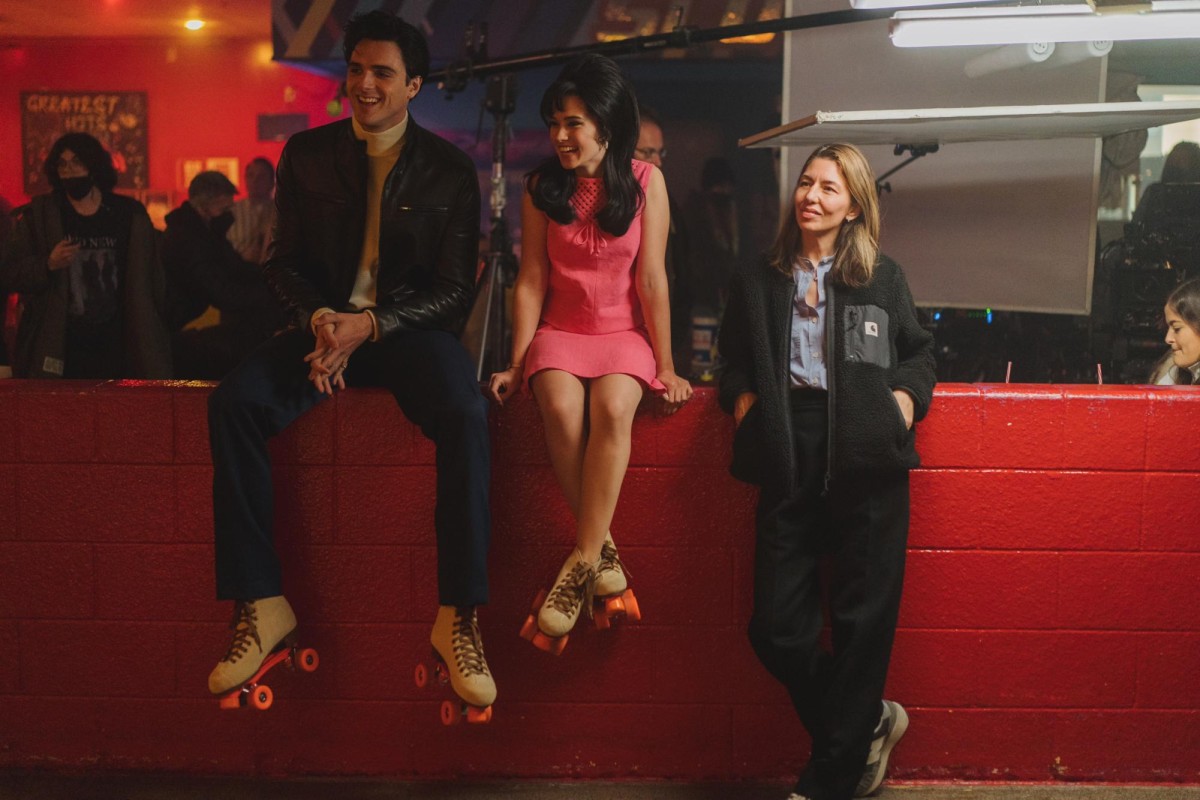Whether it’s Marie Antoinette running through the halls of Versailles to The Strokes’ “What Ever Happened?” or Lux and Trip making out under the bleachers to 10cc’s “I’m Not in Love,” Sofia Coppola is no stranger to selecting iconic soundtracks for her films. With her 2023 release “Priscilla,” she pairs the film with a blend of classics and contemporary tracks, enhancing the tragedy of the story — without ever using any of Elvis’ own hits.
Baz Luhrmann’s “Elvis” put the “King” back in the center of pop culture, but felt fairly one-note in its perspective. Luhrmann barely paid attention to Elvis’ relationship with Priscilla and decorated the soundtrack with covers and remixes of his hits. A year later, Coppola offered her rebuttal, a darker story that shed light on the superstar’s problematic romance and Priscilla’s trauma. Unlike Luhrmann’s biopic, Coppola’s soundtrack doesn’t include a single song from his catalog. Instead, she curated a variety of songs that beautifully captured Priscilla’s experiences.
Coppola curated a soundtrack that epitomized the time period and emotions of the characters, sometimes with a dash of irony. The Little Dippers’ “Forever” plays during a montage where Elvis not only chooses Priscilla’s outfits, but also gives her a matching handgun with each ensemble. The lilting piano melody paired with lyrics like “Hold me, kiss me,” evokes feelings of deep love, something that’s hilariously followed by a sequence of Elvis rollerblading with his rat pack — which he at times prioritizes over his own marriage.
Similarly, the intensely upbeat synth of Dan Deacon’s “The Crystal Cat” plays after Elvis tells Priscilla that she needs a makeover. Still naive and drunk on star-struck admiration, Priscilla beams, excited to follow his instructions. The 2007 song is the exact opposite of “Forever,” but it’s able to capture the rush of being the focus of Elvis’ affections and foreshadows the inevitable disaster in Priscilla’s attempts to maintain them.
The soundtrack isn’t entirely tongue-in-cheek. The film’s opening is backed by a Ramones cover of “Baby, I Love You,” originally recorded by the Ronettes. The song encapsulates the experience of getting ready to see your crush, as Priscilla coats on thick winged eyeliner and way too much Aqua Net. The cover is not technically “period accurate,” but it captures the timeless emotions of being a teenage girl.
Tommy James and The Shondells’ “Crimson and Clover” is another standout track with its psychedelic, reverberating guitar and drawn-out lyrics. The song plays during the couple’s first kiss, reminding viewers of the thrill and electricity associated with the formative moment.
The romantic motif for the film is “Venus” by Frankie Avalon. It’s used instrumentally throughout many moments, including the couple’s first introduction during a party at Elvis’ west German residence. The song is not only reflective of the ’50s — it was also playing in real life when the couple first met, according to Priscilla’s memoir “Elvis and Me.” Like “Forever,” the song is another timeless love theme that your grandparents likely know by heart.
The latter half of the film is a depressing watch, with Elvis’ temper and substance abuse getting the best of him. At this point, Priscilla’s had enough. Audiences familiar with their story know how it ends, but they still hold out hope that things will get better.
With such an emotive track list from start to finish, it is only natural that Coppola accompanies the film’s devastating ending with an equally poignant song: Enter Dolly Parton. While Priscilla drives away from Graceland — his Tennessee estate — leaving Elvis once and for all, Parton’s song “I Will Always Love You” begins playing. This genius choice can be attributed to Coppola and her music supervisor and husband, Thomas Mars. With lyrics such as “If I should stay / I would only be in your way,” it perfectly depicts Priscilla’s complicated emotions.
The song’s meaning runs deeper than that. Elvis loved the song and, according to Parton, used it to serenade Priscilla after signing their divorce papers. He even wanted to cover it, and Parton was on board — until his infamous manager demanded publishing rights.
The dramatic finale of Priscilla escaping Graceland wouldn’t be the same without this track. Priscilla, like Parton, is keeping her life for herself. She denies staying with him and regains her power. Through the voice of Parton and Coppola’s detailed playlist, Priscilla gets the fairy-tale ending she deserves.
Contact Jordan Wilkens at [email protected].

























































































































































